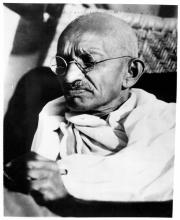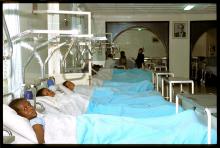Nicholas Kristof

Mention the concept of “nonviolent resistance” and two names immediately come to mind: Mahatma Gandhi, the Indian leader who led his nation to independence from British colonial rule, and Martin Luther King Jr., who led the struggle for civil rights in America. Tragically, both champions of nonviolence were assassinated: Gandhi in 1948 and King 20 years later. Today many people throughout the world revere both advocates of nonviolence.
While Gandhi and King were largely successful in their efforts, the question remains whether nonviolent resistance is always the most effective strategy in the face of radical evil, injustice, and aggression. After all, there remains a thin line between nonviolence and martyrdom.
Professor Charles DiSalvo of West Virginia University has recently published “M.K. Gandhi, Attorney at Law: The Man Before the Mahatma,” an excellent study of Gandhi’s 20 years as a young attorney in South Africa where he faced anti-Indian stereotyping and bigotry.
Interestingly, Gandhi’s two closest friends were Jews he knew in Durban and Johannesburg. But despite Gandhi’s personal friendships and his commitment to freedom and security for his own people, he was indifferent, at best, or naive, about the Nazi persecution of Jews.

“An obstetric fistula,” I said, standing in the pulpit of my 200-year old church, “is a hole between a woman’s vagina and her bowel, or between her vagina and her bladder.”
The congregation’s discomfort was palpable. Later someone told me that they couldn’t believe that I’d had the nerve to say the “v-word” twice! It wasn’t exactly the effect I’d hoped to have, but it wasn’t entirely surprising.
Fistula is a childbirth injury that’s unknown today in the developed West, though before the advent of modern maternity care, it affected women — especially poor women — in America as well as Europe. It was likely the reason, at least in some cases, for a woman being euphemistically spoken or written of as an ‘invalid,’ or as having been ‘invalided’ by the birth of a child. Fistula’s story has always been one of (usually secret) suffering; even the surgery to repair the injury, developed by American gynecologist J. Marion Sims in 1840s Alabama, was performed experimentally upon slaves that Sims purchased for the express purpose of perfecting his technique before turning to white patients.
It’s women of color who still all but exclusively suffer fistula’s life-destroying effects.
Fistula happens when a baby gets stuck while being born, often because a girl is either underage, has a pelvic deformity, or has had her genitals deformed by female genital cutting — and there’s no trained person to help. She’ll labor for days without success. Only after the baby is dead and partially softened does it slip out from the exhausted mother, whose suffering has only begun. Days of pressure from the baby’s head have killed blood vessels in her vaginal tissues, which now decay, leaving a hole — or holes — from which urine and feces leak. She has become incontinent. Her husband divorces her. Her family makes her leave the house because of her stench. She can’t even keep herself clean enough, because the water she walks some distance to collect each day is just enough for basic use. The village children mock her for her stench; her neighbors ignore her.
Her story is multiplied between 50,000 to 100,000 times each year.

For the sake of the world, we should all be feminists. And given what we know about the role of independent, empowered women in the community of disciples, for the sake world, we might be “Christians.”
Raymond Brown, the late, great scholar of John, writes: “In this Gospel, where light and darkness play such a role, darkness lasts until someone believes in the risen Jesus.”
Therefore no darkness, no heartbreak, no grief, no injustice can long stand where the Risen Christ is proclaimed. Jesus Christ is the light of the world. The light shines in the darknessa and the darkness does not — cannot — will not overcome the light.
[caption id="attachment_34028" align="alignleft" width="214" caption="Detail of a sculpture at the site of a former slave market, Christ Church, Zanzibar. By Cathleen Falsani."][/caption]
We cannot allow the history of a brutal genocide to repeat itself in Sudan, nor denial and inaction to repeat itself in Washington, D.C., but both are happening at this very moment
By all journalistic reports, it was the Egyptian government of President Hosni Mubarak that sent thousands of armed thugs into Tahrir Square and the streets of Cairo yesterday to bring violence to w
Nicholas Kristof dubbed the film Budrus, "this year's must-see documentary," noting that the fil
Between July 30 and August 3, a reign of terror was released upon villages in the Congo's eastern mining districts.